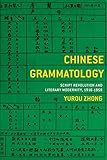Chinese grammatology script revolution and Chinese literary modernity, 1916-1958 Yurou Zhong
Material type: TextPublication details: New York Columbia University Press 2019.Description: 1 online resource (xii, 279 pages) illustrationsContent type:
TextPublication details: New York Columbia University Press 2019.Description: 1 online resource (xii, 279 pages) illustrationsContent type: - text
- computer
- online resource
- 9780231549899
- 9780231192637
- PL1175 .C456 2019
- COPYRIGHT NOT covered - Click this link to request copyright permission: https://lib.ciu.edu/copyright-request-form
| Item type | Current library | Collection | Call number | URL | Status | Date due | Barcode | |
|---|---|---|---|---|---|---|---|---|
 Online Book (LOGIN USING YOUR MY CIU LOGIN AND PASSWORD)
Online Book (LOGIN USING YOUR MY CIU LOGIN AND PASSWORD)
|
G. Allen Fleece Library ONLINE | Non-fiction | PL1175 (Browse shelf(Opens below)) | Link to resource | Available | on1098217857 |
"In premodern East Asia, Chinese dominated everything from poetry to international trade, but by the early twentieth century, the ancient Chinese script began to be targeted as a roadblock to literacy, science, and democracy. Its abolition and replacement by the Latin alphabet came to be seen as a necessary condition of modernity. In China, both the Kuomintang Nationalist government in the 1920s and the Chinese Communist Party in the 1930s had active movements for replacing Chinese script with Latin characters. Nonetheless, when script reform was taken up by the party in 1958, simplification, not latinization, was instituted, and today Chinese script is alive and well. Yurou Zhong argues that just as broader international currents swept the latinization movement in, a postwar anti-imperial critique of Western ethnocentrism was responsible for the retention of the script. She also relates these political movements to the birth of modern Chinese literature and to similar movements in other--mostly socialist--countries at the time"--
Introduction: Voiceless China and its phonocentric turn -- The beginning and the end of alphabetic universalism -- Phonocentric dialectics -- "Can subaltern workers write?" -- "Reinventing children" -- Toward a Chinese grammatology -- Epilogue: The last custodian
COPYRIGHT NOT covered - Click this link to request copyright permission:
There are no comments on this title.
